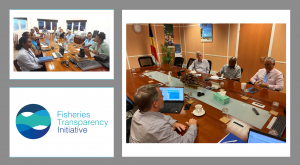The reputation of the FiTI as an initiative promoting good governance in fisheries is one of the initiative’s greatest assets. This is also a major driver motivating countries to join the FiTI and benefit from its international standing.
Robust and objective assurance procedures play an important role in creating and maintaining this reputation to ensure equal treatment of all countries.
Regular validations of implementing countries are therefore an essential part of the FiTI
process,
- serving to assess an implementing country’s compliance with the FiTI Standard;
- safeguarding the integrity of the FiTI by holding all FiTI implementing countries to the same global standard;
- assessing the impact of the FiTI in the country, reflecting stakeholder opinions, and listing recommendations for progressive improvement; and
- promoting dialogue and learning at the country level.
Validation occurs at different points during a country’s FiTI implementation:
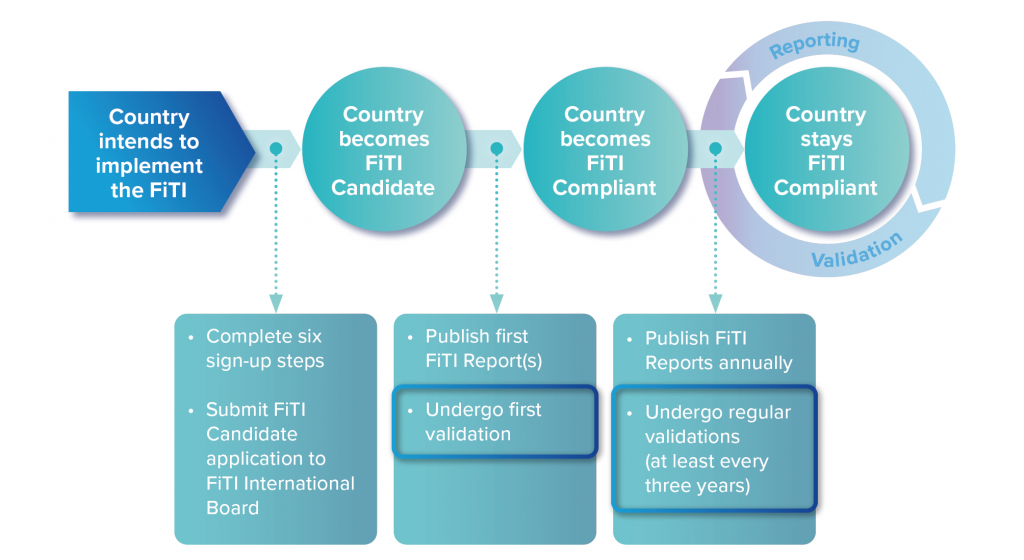
The FiTI International Board holds ultimate responsibility over the validation process, which is spread across three phases of validation, each building on the conclusions and recommendations of the previous phase.
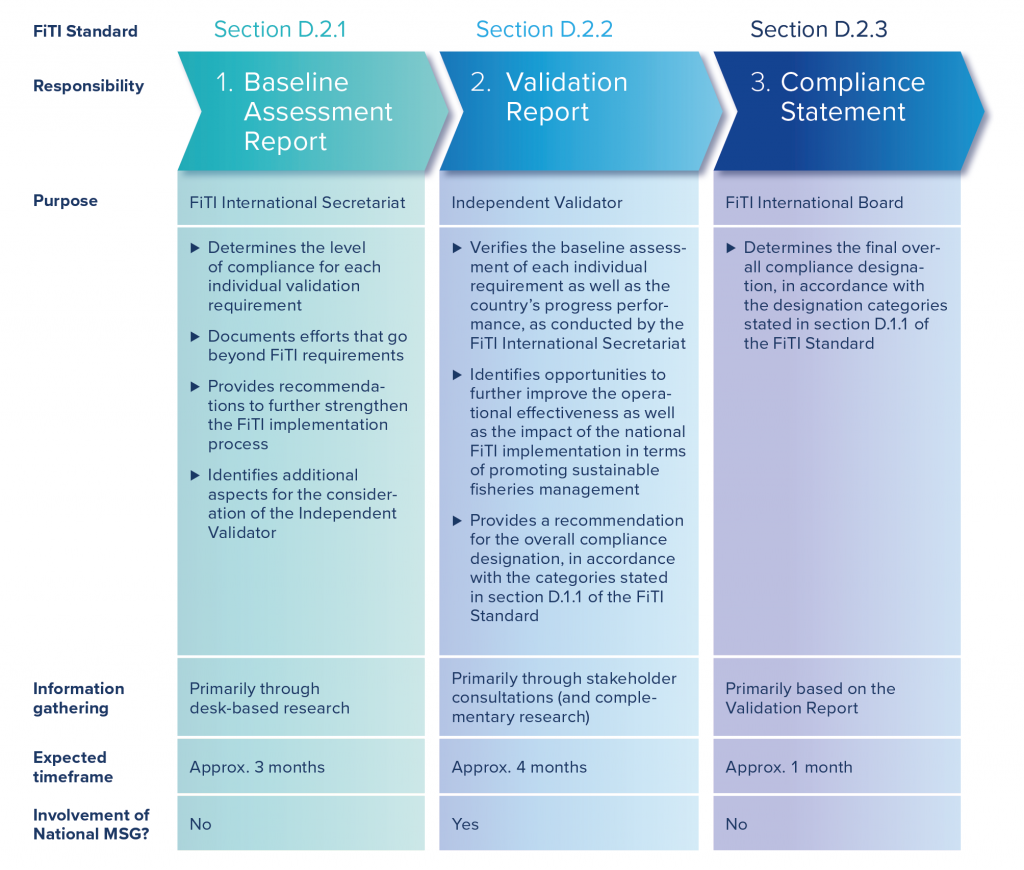
Phase 1: Baseline Assessment Report
The FiTI International Secretariat initiates the validation process by conducting a desk research relating to the country’s compliance with the FiTI Standard, without major stakeholder consultations.
In accordance with section D.1.1 of the FiTI Standard, the validation process assesses the country’s level of compliance for 21 individual FiTI requirements defined in the sections B.1, B.2 and B.3 of the FiTI Standard:
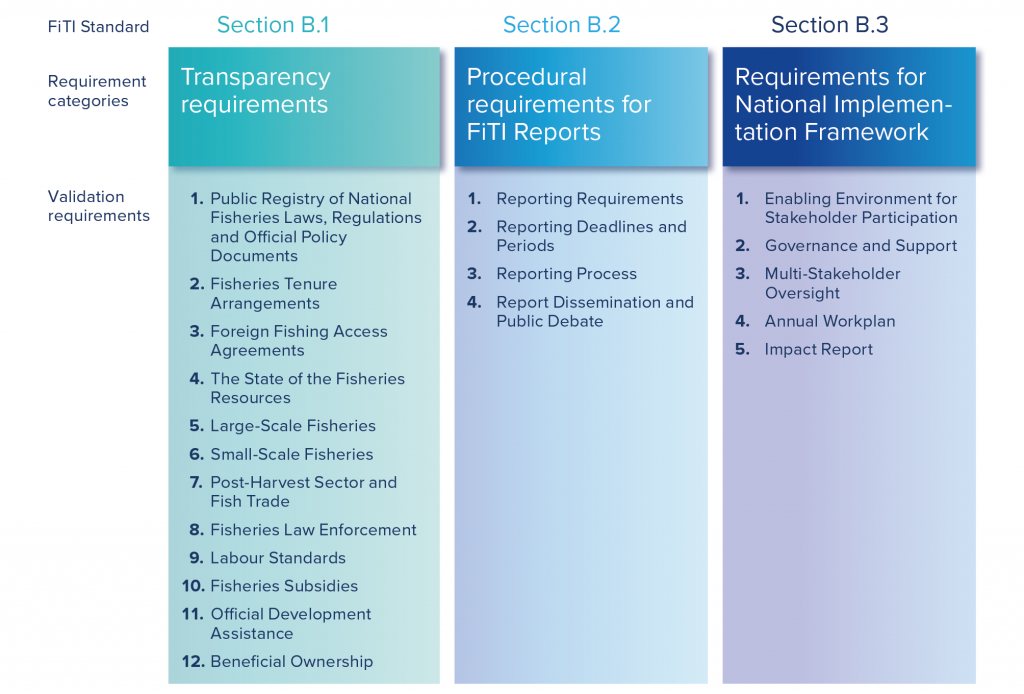
Only the country’s FiTI Reports published within the timeframe of the validation (as determined by the FiTI International Board) should be taken into account when assessing the country’s compliance designations with transparency and procedural requirements.
The Baseline Assessment Report serves as the base for the subsequent validation phases. Before submitting the report to the Independent Validator, the FiTI International Secretariat will provide the draft report to the FiTI International Board for comments or clarifications.
After completion of the entire validation process (based on the approval of the FiTI International Board, phase three), the Baseline Assessment Report will be made publicly available.
Phase 2: Validation Report
Given the often close interaction between the FiTI International Secretariat and a country’s National MSG (e.g. in the development of FiTI Reports), and in order to avoid perceptions of bias, the involvement of an Independent Validator in the validation process is crucial.
Based on the Baseline Assessment Report of the FiTI International Secretariat, an Independent Validator will conduct a verification of the Secretariat’s initial assessment and also determine recommendations to further strengthen the impact of the FiTI in the country.
Whereas the Secretariat’s initial assessment is conducted as a technical, desk-based research, the second phase comprises primarily of stakeholder consultations (as well as complementary desk research). This phase of the process serves both roles, that of fact-finding and gathering of viewpoints of various stakeholders and key informants.
As the main activity of this process phase, the Independent Validator is tasked with conducting interviews with a diverse set of national and international stakeholders. The objective of obtaining stakeholder feedback is twofold:
- to further assess the reliability of the initial Baseline Assessment Report prepared by the FiTI International Secretariat; and
- to gather information, recommendations and lessons learned that will further strengthen the FiTI implementation in the country.
The Independent Validator is then tasked with compiling the information from the desk research and stakeholder interviews into a Validation Report. This report summarises the validator’s findings, evidence, references and recommendations, as well as the proposed overall compliance designation.
After an initial review of the draft Validation Report by the FiTI International Secretariat, a feedback period ensues in which the National MSG is invited to review the draft report to identify possible factual errors, offer additional information, clarifications, and other evidence. However, the National MSG does not have a veto power over any section of the report.
After completion of the entire validation process (based on the approval of the FiTI International Board, phase three), the Validation Report will be made publicly available.
Phase 3: Compliance Statement
In the third and final phase of the validation process, the FiTI International Board (or a dedicated Sub-Committee) reviews the assessments and recommendations documented in the Independent Validator’s Validation Report in order to make its final determination regarding the implementing country’s overall compliance designation.
In doing this, the FiTI International Board primarily takes the Independent Validator’s Validation Report into account. The FiTI International Board is not required to conduct additional research or stakeholder interviews, though these can be scheduled if deemed necessary. The FiTI International Board retains full independence from the Independent Validator.
The FiTI International Board documents its final validation assessment in a brief Compliance Statement. After completion of the entire validation process (based on the approval of the FiTI International Board), the Compliance Statement will be made publicly available.
The FiTI Standard does not make provisions for a redress mechanism to alter the final outcome of a validation once announced. As stated above, National MSGs do have the possibility to comment on the Independent Validator’s draft Validation Report. However, to protect the independence and credibility of the FiTI, the FiTI International Board’s decision on the overall compliance designation of a FiTI implementing country is final and cannot be appealed.
Guidance Note #3 – Validating countries
Section D of the FiTI Standard lists the provisions that must be applied when conducting validations. A Guidance Note has been prepared for the FiTI International Secretariat, Independent Validators and the FiTI International Board on how to conduct validations in accordance with these provisions. It also clarifies expectations of FiTI implementing countries. It explains the scope, guiding principles and procedures for validation, gives guidance on assessing each requirement, and sets out standard terms of reference for validations and validation reports.
Further details on timeframes, outcomes and consequences of validation are described in more detail in this Guidance Note. Cases of exceptional validations conducted outside the normal schedule are also covered.
This Guidance Note is based entirely on these elements and the letter and spirit of the FiTI Standard as a whole. It therefore does not introduce any additional requirements or procedures other than those already outlined in the FiTI Standard.
Relevant posts
- Mauritania achieves ‘Compliant’ status under the FiTI Standard

- Seychelles is the first country to achieve ‘Compliant’ status under the FiTI Standard
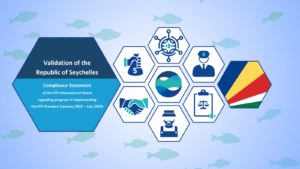
- FiTI, stakeholders discuss upcoming compliance validation for Mauritania
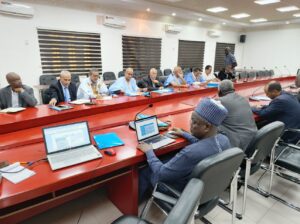
- Mauritania reviews implementation progress, prepares for second FiTI validation

- FiTI International Board sees ‘meaningful progress’ of FiTI implementation in Mauritania
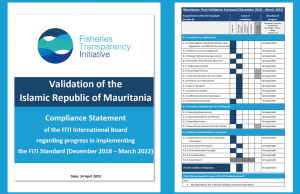
- First validation of Seychelles shows ‘meaningful progress’ in implementing the FiTI Standard
